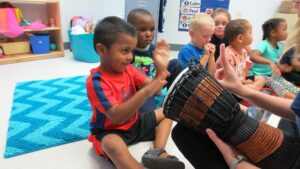Developing programs and fostering connections through responsive and actionable research and evaluation
What we do

SSRI’s Applied Research, Evaluation, & Engagement provides applied research and evaluation expertise and partnership to Duke programs/faculty, supports external and community partners through research/practice partnerships, and fosters educational opportunities in applied research and evaluation. Ultimately, we espouse responsive and actionable research and evaluation. Our team provides research and evaluation expertise, partnership, services, and learning opportunities for Duke-based and community entities. We partner in development of funding proposal with applied research, evaluation, or engagement components, as well as the implementation of these components. Our areas of focus include: logic modeling and theory of change development, research and evaluation design and planning; data collection and data analysis; and dissemination in various forms, including to applied and practitioner audiences. Empirically, we have experience and expertise in a variety of qualitative methods, quantitative methods, and community-engaged research processes. Our processes are rooted in social science methodologies, but we take an intentionally interdisciplinary lens to their application.
How we do it

We offer, capacity permitting, short-term consultation and advising on our areas of expertise. In addition, we engage in longer-term research and evaluation engagement; this includes leading research /evaluation efforts with applied partners, as well serving as research and/or evaluation collaborators. In these efforts, we take an asset-based approach that views each entity as bringing valuable expertise, and where collaborative efforts build a stronger result. Finally, we offer structured educational and learning opportunities. This includes trainings to Duke and community members; undergraduate courses (e.g., through the SSRI Social Science Research Lab); and graduate student and postdoctoral internship and assistantship opportunities. We are additionally supportive of graduate student and postdoctoral scholar careers beyond traditional academic trajectories; we have provided workshops in this area through the Graduate School and postdoctoral services, and we have provided advising in this area.
Why we do it
Our efforts meet the following aims:
University and research development
- Support and further Duke research efforts, including enhancing development of funding proposals & fulfillment of funding requirements
- Foster the informed development of internal university programs using evidence-based practice
Community engagement and research-practice partnership:
- Provide meaningful civic/community engagement that draws on Duke’s research expertise, as part of Duke’s community engagement efforts
- Set a foundation for integrating external/ community programs into university faculty/research
- Support the informed development of community programs using evidence-based practice
Teaching and learning opportunities:
- Further Duke learners’ diversity of experiential research opportunities
- Address relative dearth of educational offerings on evaluation
- Build supports for diverse career paths, including for doctoral students
- Provide community engagement opportunities through research
Our Work Includes:
- Overall strategic planning
- Logic modeling, theory of change development, and other aspects of outcome mapping
- Evaluation design and planning
- Data collection and analysis, both qualitative and quantitative
- Accessible reporting that focuses on program successes and avenues for continues program improvement
- Developing evaluation language for finding requests

Highlighted Collaborations
 Sarah Gaither was awarded a Spencer Foundation grant to assess cross-race roommate experience at Duke. To do this, she needed to blend three diverse data repositories together: Information on roommate pairings, survey data on housing and residential life, and several survey and data elements from institutional research. Although the project was conceived without our support, SSRI helped to move this forward quicker, more broadly and more efficiently. We were able to gain access to all the data, import it into the PRDN, and construct a variety of roommate variables including cross-race, gender, political identity, SES, and sexual orientation. To help protect this sensitive data, the project will conduct all their analyses using the de-identified data in the PRDN.
Sarah Gaither was awarded a Spencer Foundation grant to assess cross-race roommate experience at Duke. To do this, she needed to blend three diverse data repositories together: Information on roommate pairings, survey data on housing and residential life, and several survey and data elements from institutional research. Although the project was conceived without our support, SSRI helped to move this forward quicker, more broadly and more efficiently. We were able to gain access to all the data, import it into the PRDN, and construct a variety of roommate variables including cross-race, gender, political identity, SES, and sexual orientation. To help protect this sensitive data, the project will conduct all their analyses using the de-identified data in the PRDN.
 The Resilience Project is a collaboration between four colleges and universities in North and South Carolina that seeks to understand the sources of stress and anxiety for incoming college students as well as factors that help students to thrive despite adversity. Students at Duke University, Davidson College, Furman University, and Johnson C. Smith University are asked to share information on a variety of topics relevant to college life, including social interactions, physical and mental health, well-being and academics. The information gained through this process will be used to design interventions at each campus aimed at enhancing students’ resiliency. SSRI provides assistance in managing sensitive data that is collected by the Resilience Project, including tasks like importing data, performing initial data cleaning tasks, and creating de-identified data sets. We provide expertise on creating data documentation and setting up file structures and permissions, and we facilitate communication between the project team and SSRI IT regarding technical aspects of the Protected Research Data Network (PRDN).
The Resilience Project is a collaboration between four colleges and universities in North and South Carolina that seeks to understand the sources of stress and anxiety for incoming college students as well as factors that help students to thrive despite adversity. Students at Duke University, Davidson College, Furman University, and Johnson C. Smith University are asked to share information on a variety of topics relevant to college life, including social interactions, physical and mental health, well-being and academics. The information gained through this process will be used to design interventions at each campus aimed at enhancing students’ resiliency. SSRI provides assistance in managing sensitive data that is collected by the Resilience Project, including tasks like importing data, performing initial data cleaning tasks, and creating de-identified data sets. We provide expertise on creating data documentation and setting up file structures and permissions, and we facilitate communication between the project team and SSRI IT regarding technical aspects of the Protected Research Data Network (PRDN).
 Voices Together is a triangle-based nonprofit that provides music therapy to children and adults with developmental and emotional disabilities to support social communication and social-emotional learning. SSRI has been working with Voices Together since 2014. We lead and implemented four years of Bass Connections teams which piloted three different types of interventions: one with a mixed special education class, one with an ASD only set of classrooms, and one with special education teachers to support their classrooms. From these interventions, multiple academic papers and presentations have been produced along with practitioner and public leaning documents. Our research substantiation of the model has allowed Voices Together to enter into a long-term pre-employment training with the State of North Carolina and to work toward early intervention programming as well.
Voices Together is a triangle-based nonprofit that provides music therapy to children and adults with developmental and emotional disabilities to support social communication and social-emotional learning. SSRI has been working with Voices Together since 2014. We lead and implemented four years of Bass Connections teams which piloted three different types of interventions: one with a mixed special education class, one with an ASD only set of classrooms, and one with special education teachers to support their classrooms. From these interventions, multiple academic papers and presentations have been produced along with practitioner and public leaning documents. Our research substantiation of the model has allowed Voices Together to enter into a long-term pre-employment training with the State of North Carolina and to work toward early intervention programming as well.
 The department of Biology was awarded a NSF grant entitled “Accelerating the pace of research and implementation of writing-to-learn pedagogies across STEM disciplines” (PIs: Julie Reynolds and Robert Thompson). This includes a study of STEM faculty and student writing interventions in STEM classes at three schools: Duke, University of Minnesota, and University of Michigan. SSRI has worked with the research team for the past three years, providing leadership and support on data collection, management, and analysis for the project. This support has helped the project publish several key publications on this topic and SSRI personnel have been contributing authors.
The department of Biology was awarded a NSF grant entitled “Accelerating the pace of research and implementation of writing-to-learn pedagogies across STEM disciplines” (PIs: Julie Reynolds and Robert Thompson). This includes a study of STEM faculty and student writing interventions in STEM classes at three schools: Duke, University of Minnesota, and University of Michigan. SSRI has worked with the research team for the past three years, providing leadership and support on data collection, management, and analysis for the project. This support has helped the project publish several key publications on this topic and SSRI personnel have been contributing authors.
